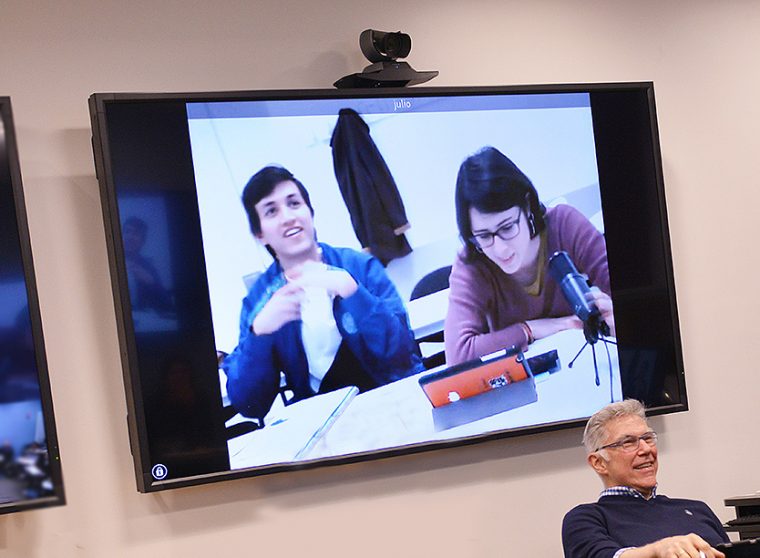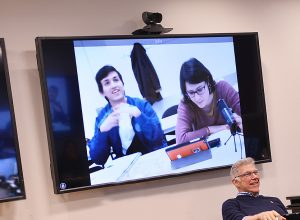Adapting to a New Normal at Wesleyan

The central consideration for Wesleyan’s faculty and administration during the transition to a distance-learning model as a result of the threat of COVID-19 has been how best to support students (particularly those who are high-need or have extenuating personal circumstances) and ensure the continuity of their Wesleyan experience.
“We say we’re a caring community,” President Michael Roth ’78 noted in an all-staff call on Tuesday, March 17. “Now is the time to prove that. We are practiced at pulling together, usually on joyous occasions. But right now, we have to prioritize flexibility for our students, faculty, and staff so that they stay as healthy as possible…and I’m very grateful to them for figuring out how to retool classes and deliver a rewarding Wesleyan experience remotely.”
Academic Support
 The hallmark of a Wesleyan education has long been the rich personal interactions between faculty and students. Recreating that in the online space has posed an interesting challenge for faculty, but it has come as no surprise to Rob Rosenthal, interim provost and senior vice president for academic affairs, to see them rise to it.
The hallmark of a Wesleyan education has long been the rich personal interactions between faculty and students. Recreating that in the online space has posed an interesting challenge for faculty, but it has come as no surprise to Rob Rosenthal, interim provost and senior vice president for academic affairs, to see them rise to it.
“It’s so impressive the way faculty have just jumped into this,” Rosenthal said. “Together, we are figuring out ways to deliver a Wesleyan education that we had never envisioned three weeks ago. It’s inspiring to me.”
Rosenthal said faculty are focusing on three particular areas during this transition. First, they are being directed to contact each student in their classes and work out one or several methods of instruction that allow those students to participate as their needs allow. This will help solve for students who don’t have easy access to personal computers or the internet.
“We’re urging faculty to be as flexible as possible,” Rosenthal said. “We fully understand that it won’t be one method fits all.”
Second, Wesleyan has loosened its usual academic requirements to allow for additional time and flexibility to complete work. Thesis deadlines have been extended by a week, and students can choose between taking classes for credit/no credit, even for requirements in their majors, and inform faculty of their choice by the end of the semester. Finally, due dates for incompletes have been moved from 30 days after the end of the spring semester to the first day of the fall semester, potentially allowing students to use the summer months to make up any necessary work.
Beyond these adjustments, students and faculty are tapping into and integrating online resources in interesting ways. President Roth, for example, teaches an on-campus course called Modern and Postmodern that is also available on Coursera. That availability allows him to take background lectures he recorded in previous years and use them as the basis for classes now, which can then be responsive to the questions of current students.
“Not only are we thinking about things in ways we hadn’t three weeks ago,” said Nicole Stanton, dean of the Arts and Humanities Division, who will serve as Wesleyan’s 12th provost and senior vice president for academic affairs starting in May. “There’s real innovation going on here. There are many faculty who are taking their technical expertise and collaborating with students to create whole new distance learning modalities. We can’t guarantee that these outcomes will be better than the original, in-person learning experience. And it’s a challenging moment, to be sure. But it’s also a moment that’s bringing about this real sense of solidarity and creativity, and ultimately we’re going to see some amazing work come out of it.”
Student Financial Assistance and Commencement
In addition to adapting to the distance learning environment, one of Wesleyan’s top priorities has been providing students with continued housing and financial support. Some students will be eligible to remain on campus, with continued health and dining services. Students who leave campus will be reimbursed on a prorated basis for their room and board costs, regardless of their financial status.
“We’re fortunate to have staff working tirelessly to help all of our students and especially those who need assistance,” President Roth said. “We’ve raised quite a lot of money for such purposes, including $60 million in financial aid and an emergency fund that we are adding funds to. We’re fortunate for the continued support of generous parents, alumni, and colleagues who continue to donate to that emergency fund to help students who are in financial distress as a result of this outbreak.”
The University does not yet have a decision about whether or not it will be able to host an on-campus Commencement as scheduled in May. But technology is offering possible alternative solutions for many typical campus functions, including two critical upcoming decision points for students that are already conducted online: housing selection and course selection.
“While we’re still unclear about Commencement, President Roth has said how committed he is to figuring out what we can do to properly honor our graduating students,” said Mike Whaley, vice president for student affairs. “This is such a disruption and may continue to be for some time. But we will be sure we find a way to properly celebrate with those students and their families who have been and continue to be such an integral part of our community.”
Student Move-Out
Students who are able have been encouraged to reclaim their belongings and leave campus no later than March 23. Those students who live beyond driving distance of campus have an extended window of time in which to move out of their residence, and should plan to retrieve their belongings at any point prior to April 30.
The Office of Residential Life has set up a page of Frequently Asked Questions to address the logistics of the move-out process, and is managing the process so that students returning for their belongings do not unnecessarily come into contact with students who remain on campus.
Life on Campus
According to President Roth, roughly 400 to 500 students will remain on campus for the remainder of the semester. The University asked students with specific needs to submit a petition form, which helped Wesleyan assess and accommodate those requests.
“Successful petitions surrounded those with housing insecurity, international students who can’t get home because of travel restrictions, and people with really extenuating personal circumstances,” Whaley said. “We reviewed each one individually and then made a decision. There is a delicate balance there because many students think of this place as home, and often Wesleyan is their only home or they can’t easily get to another place they think of in that capacity. At the same time, we want to limit the number of students on campus to protect the safety of those who need to stay.”
Wesleyan is continuing all essential services for those students, albeit in modified capacities. Because of restrictions the state of Connecticut has put on congregating in restaurants, for example, meals will be offered in a “grab and go” style for the foreseeable future to limit in-person contact. The Office of Residential Life will continue to have staff on campus for any needs that arise; Public Safety will continue to monitor the campus and respond to any emergencies; and class deans have transitioned to remote work but will be available to guide students through any personal or academic challenges they may face.
The University’s Health Services and Counseling and Psychological Services offices both remain staffed, as well, and ready to respond to students with physical or mental health concerns. Additionally, Dr. Thomas McLarney, Wesleyan’s medical director, will be providing remaining students with practical tips for minimizing their potential exposure to the coronavirus, as well as working closely with University staff to make sure the interim housing arrangements allow for the proper distancing and, if needed, proper space for quarantine.
“We do expect at some point that we will have cases of COVID on campus,” Whaley said. “With the anticipated spread of the disease, we have to plan for that reality. So, we’re in the process of identifying the best areas for quarantining if or when necessary. Some of our housing has individual kitchens and bathrooms and those are the options we’d likely look at in that scenario.”
“Health Services is also setting up a separate location to screen for anyone that presents with respiratory illness or fever,” said Rick Culliton, associate vice president for student affairs and dean of students. “It’s important that we can see and serve those students as necessary, and it’s also important that we keep them separate from the general health center so as to limit everyone’s exposure.”
Student Emergency Fund
Beyond curricular and campus support, the University has established an official Wesleyan Emergency Fund for Students, from which all proceeds go directly to assisting the most vulnerable students with travel costs, housing, and meals.
“The University has committed to providing financial assistance to those in need with moving, travel, and other expenses,” wrote Frantz Williams ’99, vice president for advancement, in a message to faculty. “We don’t want this already challenging time to be made worse by financial hardship.”

